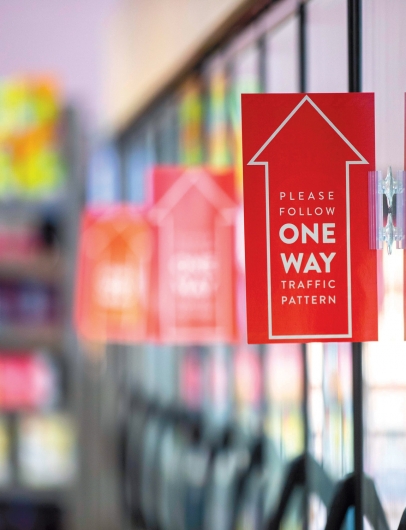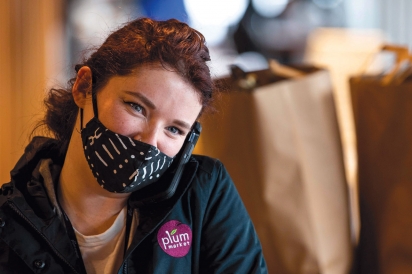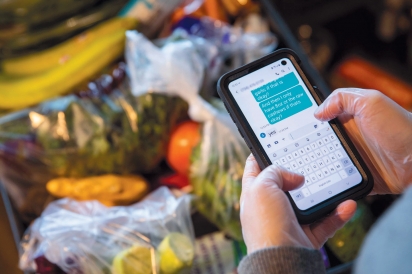Delivering the Goods
How local food businesses adapted to the coronavirus
Curbside pickup. Contactless delivery. Physically distanced store aisles. A year ago these terms were hardly on anyone’s radar, but in 2020 they became a regular part of our lexicon as a global pandemic dramatically changed how we shop for food.
In a 2019 Gallup survey, 81 percent of respondents said they never bought groceries online. After the pandemic hit, food retailers saw online shopping soar more than 300 percent, according to the Food Retailing Industry Speaks 2020 report by the Food Industry Association (formerly the Food Marketing Institute, FMI).
In Southeast Michigan, businesses quickly adapted in the wake of the novel coronavirus and the ensuing stay-at-home orders. Independent and local retailers such as Holiday Market, Plum Market and Westborn Market quickly added online portals, curbside pickup and delivery options as bigger chains such as Kroger and Whole Foods expanded their existing delivery and pickup services and all of them instituted new safety precautions. The shift in food shopping was seismic, and successfully so, at a time when other industries faltered.
“Overall, it’s been a strong year for us, a lot of extra work, but ultimately worth it, as we’ve had no known spread within the store,” says Jarred Gild, director of operations at Western Market. While the grocery store did not add curbside or delivery services—Gild says Western’s point of sale and inventory system doesn’t accommodate these services—it still made changes, including limiting the number of customers in the store and enforcing mask wearing.
He’s noticed shoppers have changed their habits.
“Customer counts are down, but basket size is up more, which is the way things should be: Go out less often but stock up when you do,” Gild says.
The same trends are noticeable at local chain Plum Market, says Debbie Gorak, director of guest relations at Plum.
“Instead of doing many small, impulse shopping trips they seem to be doing bigger shopping trips, but fewer of them. They are planning more and are shopping for specific items,” she says.
In response to the pandemic, Plum Market created a Drive Up & Delivery program to provide a contactless option.
“Plum Market recognized that giving great guest service meant finding ways to service not only the guests who were able to visit our stores, but also the ones who couldn’t,” she says.
From the initial suggestion to implementation, Gorak says it took four weeks to get the program up and running. “One of the biggest challenges we faced was creating the program from the ground up and doing so quickly as our guests were letting us know there was an immense desire and need for the service,” she says.
While these services were added in response to the crisis, Gorak says curbside and delivery will not only stay but “continue to evolve.”
“The [businesses] who will be successful with curbside and delivery will be the ones who adapt their program to whatever the guest is looking for in that moment,” she says.
Grocers changed the way they shop too. Gild says Western Market changed their purchasing process in some ways, pivoting to restaurant suppliers for some items and to restaurants themselves for others, such as sourdough bread from Rose’s Fine Food in Detroit.
“We’re really happy that we’re able to support so many small businesses. We’ve added over a hundred new small suppliers this year, in addition to the hundreds we already worked with,” Gild says.
Restaurants perhaps pivoted the most in the food industry, in response to the pandemic. At Detroit’s Chartreuse Kitchen and Cocktails, known for its artfully plated dishes and local focus, owner Sandy Levine says the restaurant, along with other independent restaurants, “are all just doing what we can to survive. Independent restaurants are all facing serious challenges, but each one has different opportunities,” he says, pointing out that Chartreuse leases its space, which prohibits it from adding a structure outside. “Some concepts are more equipped for carryout than others, so that pivot isn’t the same for everyone. We love seeing places who’ve been creative in terms of coming up with new ways to work around this mess in safe ways, and truly hope that all of us make it through.”
The restaurant added an in-house delivery service in December to be able to employ more of its own staff. Over at The Oakland, Levine’s craft cocktail bar in Ferndale, deliveries account for no more than a handful a day, though the service has been available for several months.
At Folk, in Detroit’s Corktown neighborhood, owner Rohani Foulkes quickly shifted the business from an eat-in restaurant to a takeout/market hybrid, in a way partly returning to the roots of her first business, the now-closed Farmer’s Hand.
In addition to offering adapted versions of original Folk menu items, Foulkes says, “we’ve added an essential product and service to folks through our grocery provisions. We’re aiming to become a one-stop shop where folks can pick up a delicious takeout sandwich/ salad for at home/office plus a latte plus some groceries for dinner that night.”
While at some point more traditional forms of service and operations will return, Foulkes says she believes curbside pickup and groceries are here to stay.
“I do think we’ve realized that there is a different way of sourcing and serving and gathering and enjoying food and drink and it’s not always at a table being serviced by another human,” she says. While Foulkes chose to adapt to try new things, other business owners made the tough decision to shut down.
“At Folk we recognized and made the decision pretty early on to make that change a part of a greater and permanent goal for ourselves and our community. We’ve always believed that many of the norms and traditions our industry set before us needed to be challenged. We did it at the Farmer’s Hand with our grocery model, we did it when Folk was established with our service model and we’ll do it again with Folk Market & Café with a different way of sourcing, gathering and enjoying food.”
The vulnerability of the supply chain (laid bare notably when Tyson Foods shut down after workers contracted COVID), health and safety concerns and newfound appreciation for community have helped boost support for local food.
Shannon Brines of Brines Farm in Washtenaw County says the farm quadrupled the number of shares in its May-through-October community-supported agriculture (CSA) harvest subscription program.
“There was more demand than that, but we cut it off there based upon what we thought our capacity would be,” Brines says.
When the pandemic hit, the farm was in the latter stages of its winter CSA program and had to shift gears, seeking out new locations for pickup after the Ann Arbor Farmers Market shut down and even personally delivering to shareholders’ doorsteps. In March, working with two other organic farmers, Brines Farm set up an online farmers’ market platform called the Washtenaw Organic Collaborative, allowing customers to place orders and opt for no-contact pickup or pay extra for doorstep delivery, Brines says, adding the farm had six to 10 vendors participate each week.
Brines is now in the planning stages for the Collaborative’s upcoming season.
“I will be extremely interested to see the long-term analysis of what the sustained interest is—to see how many eaters connect the dots between local food systems, community resilience and food security,” Brines says.
Despite the obvious challenges the food industry continues to face, Levine of Chartreuse is optimistic.
“Without getting too political, one bright spot is that, regardless of where you stand, everyone wants small, independent restaurants to survive. Despite it not being enough in and of itself, the knowledge that there are so many good people willing to provide support is something that’s personally helped me through this brutal time.”
To learn more about the businesses listed in this article, and if they currently offer online ordering, curbside pick-up or delivery, go to:
Brines Farm at brinesfarm.blogspot.com
Chartreuse at chartreusekc.com
Folk at folkdetroit.com
Plum Market at plummarket.com
Westborn Market at westbornmarket.com
Western Market at westernmkt.com






